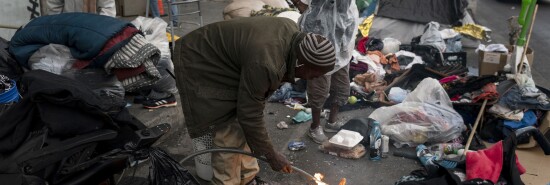
California’s homeless czars
Conn Carroll
Video Embed
Anti-vagrancy laws are older than the republic. County governments in England and states in America have always enjoyed the power to regulate the use and misuse of public spaces.
That is until the 9th U.S. Circuit Court of Appeals created a right to homelessness in 2018 when they ruled that a Boise, Idaho, anti-camping statute violated the Eighth Amendment.
TIANA LOWE DOESCHER SAYS CRIME IN DC IS ‘EVERYWHERE’ IN WAKE OF CONGRESSMAN CARJACKING
The authors of the Constitution included the Eighth Amendment in the Bill of Rights because they did not want Congress, in the words of Patrick Henry, “torturing, to extort a confession of the crime.”
To protect against this occurring, the Eighth Amendment reads, “Excessive bail shall not be required, nor excessive fines imposed, nor cruel and unusual punishments inflicted.”
Now how does a ban on “cruel and unusual punishments” get turned into a ban on camping regulations? The 9th Circuit held that locking up homeless people without first offering them shelter was cruel and unusual punishment. Never before had any court held that any punishment for a crime was “cruel and unusual,” but the 9th Circuit has always been a trailblazer.
But what happens if the homeless refuse shelter? Who decides if the shelter offered is adequate enough? Normally these would all be decisions made by elected officials. But the 9th Circuit has denied cities the right to regulate homelessness through democratic means.
So now federal judges in California have essentially become homeless czars.
For example, the city of Berkeley recently determined that a homeless encampment at the corner of 8th Street and Harrison had become a public fire hazard. The city notified the campers that the site would be temporarily cleared for cleaning. The city wasn’t even trying to fine anyone or lock them up. They just wanted the homeless to move for a couple of days so they could sanitize the area.
But homeless advocates wouldn’t even allow that! They went to federal court and got a restraining order to stop the city from cleaning the camp. The city then appealed, and the judge finally came up with a detailed plan on how the homeless camp could be cleaned by the city without violating the Eighth Amendment.
The city of Berkeley has to put all the homeless up in a motel for the duration of the cleaning, and the motel has to accept the campers’ pets as well. All tents owned by the homeless must be cleaned and stored by the city, and if any tent is deemed too unsanitary to be saved, the city must purchase a new tent for that homeless person.
CLICK HERE TO READ MORE FROM THE WASHINGTON EXAMINER
And, of course, the city had to inform the campers that their removal from the campsite was only temporary and they had the right to move back to the campsite after the cleaning was completed.
With all those hoops to jump through just to clean a homeless camp, let alone close it entirely, no wonder California has the worst homeless population in the nation.
